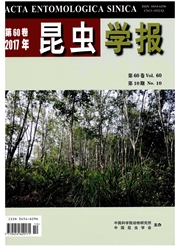

 中文摘要:
中文摘要:
围食膜是昆虫中肠上皮细胞分泌形成一层特有的非细胞性半透膜,肠粘蛋白是其重要的组成成分。本研究利用棉铃虫Helicoverpa armigera围食膜蛋白多克隆抗体免疫筛选棉铃虫中肠cDNA表达文库,共获得385个阳性克隆,经DNA测序和序列对比,确认其中之一为编码棉铃虫中肠围食膜肠粘蛋白的cDNA克隆HM72。序列分析显示,该cDNA全长为2888bp(GenBank登录号:HM017910),其中ORF长2469bp,编码823个氨基酸,包含起始密码子ATG和终止密码子TAA,在poly A末端上游19bp处有一个多聚腺苷酸信号序列AATTAA。氨基酸序列分析表明,其N-端含有16个氨基酸的信号肽,预测分子量为84.2kDa,等电点3.63,为酸性蛋白质。结构域分析表明,该蛋白具有5个几丁质结合功能域,一个粘蛋白结构域和两个甘氨酸-天冬氨酸富集区,该基因成功表达100kDa的目的蛋白。Western blot分析表明,HM72蛋白存在于棉铃虫中肠、围食膜、粪便及蜕中,并由整个中肠分泌,而在棉铃虫脂肪体、体壁、马氏管、唾腺、消化液、血淋巴中没有检测到HM72蛋白。本研究为棉铃虫生物防治相关功能基因的深入研究以及完善昆虫围食膜理论等提供了依据
 英文摘要:
英文摘要:
Peritrophic membrane(PM)is an acellular semipermeable membrane secreted by midgut epithelial cells in most insects.The insect intestinal mucin is the most important component of PM.A full-length cDNA clone HM72 encoding an intestinal mucin HM72 was identified by screening Helicoverpa armigera midgut cDNA expression library with the polyclonal antiserum against H.armigera PM proteins.The full-length cDNA of HM72 is 2 888 bp in length(GenBank accession no.HM017910),containing an open reading frame(ORF)of 2 469 bp,followed by an AT-rich untranslated region and a putative polyadenylation signal(AATTAA)located at 19 bp upstream of the polyA tail.The deduced protein sequences show that the HM72 is an acidic protein,and is synthesized as a preprotein of 823 amino acid residues with a 16-amino acid signal peptide.After removal of the signal peptide,the secreted HM72 protein is predicted to have a molecular weight of 84.2 kDa and isoelectric point of 3.63.The secreted HM72 has five chitin binding domains,one mucin domain and two glycine-aspartic acid-rich domain.HM72 was recombined into pET21b vector,and expressed by IPTG induction.Western blot analysis revealed that HM72 was more abundant in the exuviae,fecal pellets,peritrophic membrane and the midgut of H.armigera,and was secreted by cells from whole midgut.HM72 was not found in the larval fat bodies,integument,malpighian tubules,salivary glands,midgut fluid and hemolymph.This study provides a foundation for the research of bio-control associated novel genes of H.armigera and the perfection of the insect peritrophic membrane theory.
 同期刊论文项目
同期刊论文项目
 同项目期刊论文
同项目期刊论文
 期刊信息
期刊信息
